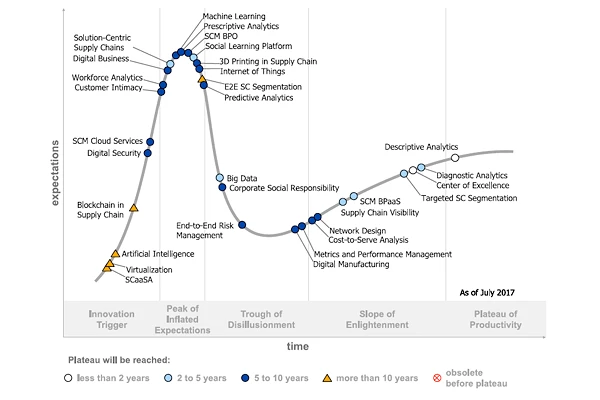Smartwatch Market Set to Swing to Growth in 2025
Global smartwatch shipments are forecast to climb 7% by the end of 2025, swinging to growth after declining for the first time in 2024, according to Counterpoint Research.

Supply chain organizations must maintain a delicate balance between innovation and operational excellence said Gartner. This balance hinges upon bimodal supply chains that can improve and run established practices profitably, while introducing new technologies and strategies that lead to competitive advantage.
"We expect several new technologies and strategies to further digitalize organizations by transforming the supply chain," said Noha Tohamy, research vice president and distinguished analyst at Gartner. "In this year’s Hype Cycle we’ve picked out several technologies and strategies that should be on the supply chain leader’s radar, as they will reach maturity in the next five years.

Gartner expects two entries to enter mainstream use in the next two to five years. Those are social learning platforms and solution-centric supply chains. In this phase Gartner expects big data to achieve mainstream maturity in the next two to five years.
Some supply chain organizations have piloted big data technologies to use larger datasets, and others are incorporating structured data from external sources or trading partners in areas like collaborative demand fulfillment and supplier performance management.
There is a now a post-hype realization that more data does not necessarily equate to better insights. Today, big data is seen as an enabler, but organizations are focusing on improving analytics and integration to drive big data strategies to productive mainstream use.
There are five technologies on the slope that Gartner expects to mature fully within the next five years. Supply chain visibility (SCV) and centers of excellence (COEs) are competencies that will soon be standard business practice. A COE develops ways to find, design, develop and implement best practices across the business.
Diagnostic analytics in the supply chain seeks to explain why something, an event or a trend, happened. Supply chain management (SCM) business process as a service (BPaaS) is an external service that delivers standardized processes through a cloud-sourced technology platform. Targeted supply chain segmentation is a technique used in business for decade. Examples of segmentation include categorizing customers or suppliers as high priority or treating parts or inventory differently based on volume.
Descriptive analytics is the application of analytics to describe what is happening, or has happened. It is the only technology that has reached the plateau of productivity in this Hype Cycle. Descriptive analytics capabilities spanning reporting, dashboards, supply chain visibility, data visualization and alerts are already improving the level of insight for many organizations, meaning mainstream adoption is less than two years away.